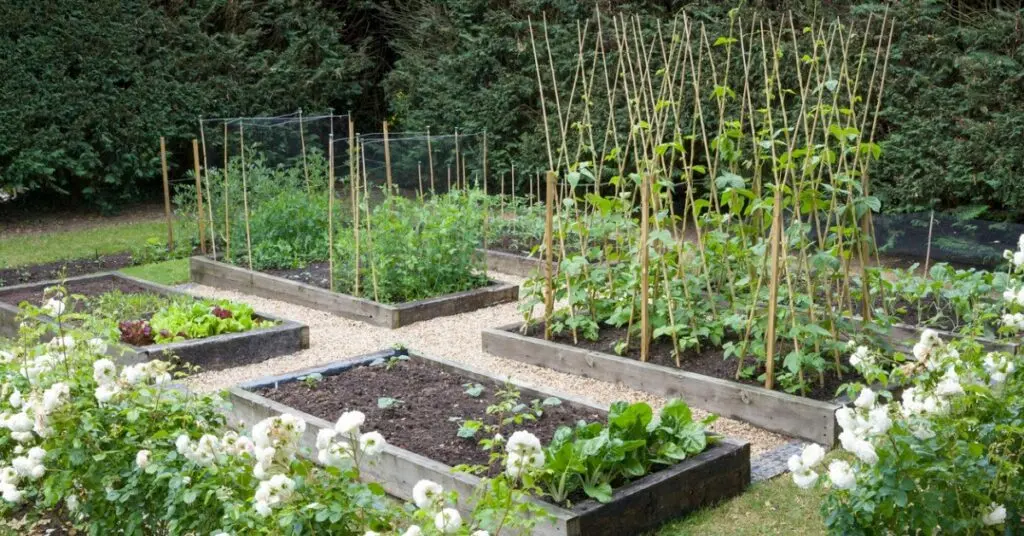Raised garden beds offer an excellent starting point for beginners in gardening. They simplify the process of growing vegetables and other plants, making it easier for those new to gardening. You can quickly establish a garden with raised beds, even with minimal experience.
Step-by-Step Instructions for Creating a New Raised Bed
-
- Choosing the Location: For optimal growth, select a sunny spot where your vegetable garden will receive 6 to 8 hours of sunlight daily. In warmer climates, like the Southern U.S., balance sunlight exposure to prevent plant burnout. For specific guidance on what growing zone you’re in and how it impacts your garden, check out What Growing Zone is North Carolina In?
- Preparing the Site: Clear the chosen area of weeds. Though your garden will be raised, starting with a clean slate helps your vegetables grow without competition.
- Building the Beds: Raised garden beds can be made from various materials, including Cedar wood, old tires, or pallets. Ensure proper drainage in your design. A size of four feet by four feet or eight feet by four feet is optimal.
- Selecting Vegetables: Not all vegetables are suited for raised bed gardening. Choose those that thrive in this environment for better yields.
- Selecting Soil: Mix equal parts of topsoil and compost. This blend provides the nutrients and structure needed for healthy vegetable growth.
Materials Needed to Start a Raised Garden Bed
-
-
- Cedar-raised beds or alternative materials for the bed structure.
- A mix of topsoil and compost or sphagnum moss for soil.
- Essential gardening tools for planting and maintenance.
-
Recommended products: Cedar Raised Garden Bed Kit, High-Quality Gardening Tools Set, and Premium Organic Compost.
Raised Bed Garden Design and Layout Ideas.
Incorporate garden design elements like neat rows or patterns for easier maintenance and aesthetic appeal. Consider the accessibility and visibility of each plant.
Plants to Avoid in Raised Beds
Avoid plants that require deeper soil than your bed can provide or those that are too sprawling and might overtake a confined space.
Raised Bed Gardening Tips & Ideas
An excellent tip for raised bed gardening is to begin with herbs and low-maintenance plants. Success breeds desire, so when you choose easier-to-maintain plants and see them flourish, you’ll be inspired to keep going and scale up.
Seek help when it’s needed. Moving soil may be challenging, but you can ask for help or use smaller buckets to mix and move soil as you start.
Building a raised bed garden offers an excellent opportunity to place the plants at the right height. If you have physical challenges, disabilities, or other limitations, placing the beds at the best height for your abilities is in your control.
Plant seeds in neat, organized rows. This will help you determine the difference between weeds and plants as they begin growing.
For herb gardening tips, take a look at this post from The GreenThumb website, Herbs for Every Home Garden: Thriving in North Carolina’s Climate.
Advantages & Disadvantages of Raised Bed Gardening
Key advantages are:
-
-
- Great when you have limited space.
- Easy for beginners to start growing a garden.
- It can be optimal for people with physical limitations.
- Better drainage for the plants.
- Easier to control weeds.
-
Some disadvantages may include:
-
-
- Cost, depending on raised bed needs.
- Requires more attention for watering.
- You may need to add more fertilizers regularly.
-
Best Raised Bed Soil for Gardens.
For beginners, choosing a 1:1 mix of topsoil and compost is best. Compost will be loaded with essential nutrients for plants, and if you lack access to compost, be sure to mix the right fertilizer into your soil. You’ll also need to add more fertilizer every week or every other week for your plants.
Best Vegetables for Raised Bed Gardening
While you can select almost any practical vegetable for your raised bed garden, here are a few of the best choices for beginners:
-
- tomatoes: There is a wide variety of tomatoes to choose from, but remember that the output (number of tomatoes produced) may be lower than it would be for an in-ground garden.
- Lettuce: This plant is easy to grow and great for beginners to get a handle on the process.
- Carrots: Choose a short carrot for raised beds, but make sure the depth of your bed is ample for this plant. Too shallow, and you’ll end up with damaged crops.
- Cucumbers: if you have a lattice, cucumbers can be an excellent addition to your raised bed garden. Work the new growth up and through the lattice as the plant grows to ensure the cucumbers hang as they grow.
- For container gardening tips, which can also apply to raised beds, read this helpful article written by The GreenThumb, again, on Container Gardening for Vegetables: Tips for a Productive Harvest

